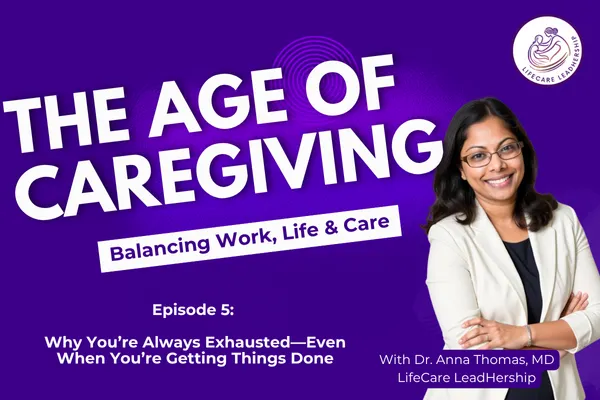
Why You’re Always Exhausted—Even When You’re Getting Things Done
Why You’re Still Tired—Even When Everything Got Done
Have you ever ended the day with a full checklist and an empty soul? The meetings happened. The meds were managed. The groceries were picked up. The work was done. And yet, as you lie in bed, a quiet question lingers: “Why am I still so tired?”
If that sounds familiar, you’re not alone—and you’re certainly not weak. You’re likely a caregiver.
As a physician and caregiver coach, I hear this all the time, especially from high-achieving professionals who are supporting aging parents, sick partners, or children with complex needs. On the outside, they’re “functioning” and “productive.” But on the inside, they’re drained to the bone.
It’s Not the Tasks—It’s the Toll
Caregiving exhaustion isn’t just about having a long to-do list. It’s about the invisible labor—the emotional, mental, and logistical load—that fills every moment of the day.
You’re not just taking someone to an appointment. You’re coordinating transportation, adjusting your work schedule, preparing for the visit, remembering key questions, managing follow-ups, and holding the emotional weight of what might be said behind those clinic doors. You’re not just managing medications. You’re negotiating with insurance, tracking refills, checking side effects, organizing pill boxes, and staying on top of complex routines. And you’re not just doing your job. You’re navigating decision fatigue, pushing through silent guilt, and still trying to meet deadlines with a smile.
This kind of invisible work rewires your nervous system. Your body gets stuck in a constant state of alert. Even when everything is “done,” your system can’t truly rest.
What Can You Do About It?
The answer isn’t to hustle harder. It’s to honor your bandwidth and protect your energy. These three mindset shifts can help you start making that change.
1. Stop Measuring Your Worth by Your Output
Caregiving doesn’t operate on clean cause-and-effect. You can pour your energy into it for hours and still see no visible improvement. That can feel demoralizing if you’re measuring your day by what you accomplished.
Instead, try a different question: “What did I protect today?” Maybe it was your parent’s dignity. Maybe it was your child’s comfort. Maybe it was your own peace of mind by saying no to something that would have pushed you past your limit. These moments are harder to measure, but they matter deeply—and they deserve to be honored.
2. Make Room for Micro-Restoration
You don’t need a week-long vacation. What you need are small, sustainable moments of restoration—what I call micro-rest. These aren’t luxuries. They’re strategies for survival.
It might look like sitting in your car for three quiet minutes before walking inside, taking a deep breath between meetings, stretching for 30 seconds between tasks, or putting your phone down for ten minutes and just being. Even saying, “Give me a moment,” and actually taking it. These tiny resets won’t change your caregiving reality—but they can change your resilience. Over time, micro-rest helps reset your nervous system and protect you from burnout before it spirals.
3. Lead with Energy, Not Just Time
We often plan our days around time—deadlines, meetings, calendars. But what we really need to manage is energy. Ask yourself: What people, activities, or environments replenish me, even a little? What drains me, no matter how short? Where am I saying “yes” when I need to say “not right now”?
This isn’t about being selfish. It’s about being strategic. Energy leadership might mean blocking off your best hour for deep work, rescheduling difficult conversations until after rest, or delegating draining tasks once a week. It could mean requesting flexibility—not because you’re failing, but because you’re planning ahead. Leadership isn’t just about showing up—it’s about sustaining the version of you that shows up strongest.
Exhaustion Isn’t a Failure. It’s a Signal.
If you’re feeling tired—even when everything’s been checked off your list—you don’t need more hustle. You need more honor. Honor for your limits, your bandwidth, and the invisible role you’re holding every single day.
Here are a few ways I can help you start making these shifts:
✅ Free Workshop – From Caregiver to Care Leader: We explore energy leadership in depth and help you build a personal action plan.
✅ Book – Balancing Care While Working: Filled with real-life stories and practical strategies to lead both at home and at work.
✅ Coaching Program – Thrive & Lead: Together, we build sustainable systems, routines, and boundaries to support your energy—not just your output.
You can find all the details at LifeCareLeadHership.com.
Final Thought
You’re not just tired. You’re carrying the safety, health, and comfort of another human being—while still trying to show up for your job, your family, and yourself. That’s not failure. That’s leadership. And leadership deserves support.
You’ve got this. And I’ve got you.
